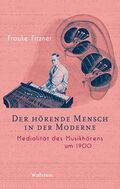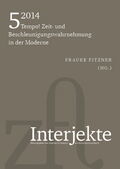The Listener in Modernity. Medialization and Anthropologization in Conceptions of Music around 1900
In 1877, the invention of the phonograph sparks the era of musical reproduction technologies, followed by the invention of the gramophone just ten years later. With the phonograph and the gramophone come the first experiences with technical-medial recording, storing, and playback of music. At the same time, the beginning of the medialization of music in the 19th century initiates the development of a scientific perspective from which music is seen as a product of human perception and thus experiences an anthropologization. Here, the reproduction technologies become a point at which anthropologization and medialization intersect: the new media change the modern order of knowledge.
This PhD thesis explored this development’s effects on the perceptions of music in the fields of “science,” “media,” and “the arts” between 1880 and 1930. It focused on these two tendencies—the medialization and the anthropologization of music—and investigated their relation.
Publications
Der hörende Mensch in der Moderne
Medialität des Musikhörens um 1900
Tempo! Zeit- und Beschleunigungswahrnehmung in der Moderne
Frauke Fitzner
- Musikinstrumente zwischen Technik- und Geistesgeschichte. Curt Sachs im Diskursfeld “Körper und Technik,” in: Jahrbuch des Staatlichen Instituts für
Musikforschung 2016. Mainz: Schott Music 2019, 213–234 - Ed.: Vom Sammeln, Klassifizieren und Interpretieren. Die zerstörte Vielfalt des Curt Sachs. Mainz: Schott 2017 (with Wolfgang Behrens and Martin Elste)
- therein: Curt Sachs, Erich Moritz von Hornbostel und die Idee eines Museums der Tonkunst, 127–133
- Verschiedene Ansätze der frühen vergleichenden Musikforschung. Carl Stumpf und Curt Sachs im Vergleich, in: Martin Ebeling (ed.): Carl Stumpfs Berliner Phonogrammarchiv. Ethnologische, musikpsychologische und erkenntnistheoretische Perspektiven. Frankfurt a.M.: Peter Lang Verlag 2016, 61–72
- Das eigene Hören hören – Beobachtung und Selbstbeobachtung in Carl Stumpfs Untersuchungen zur Verschmelzung, in: Erwägen Wissen Ethik 26 (2015), 30–32
- Der “Zwang, neue Tempi zu wählen.” Tempobeschleunigung bei Theodor W. Adorno, in: Neue Zeitschrift für Musik 176 (2015), 32–35
- Die zergliederte Einheit. Aufschreibesystem und gestalttheoretischer Anspruch bei Carl Stumpf und Erich M. von Hornbostel, in: Margret Kaiser-el-Safti (ed.): Gestalt und Gestaltung in interdisziplinärer Perspektive. Schriftenreihe der Carl Stumpf Gesellschaft Band 4. Frankfurt a.M.: Peter Lang Verlag 2014, 191–203
- “... die Notwendigkeit, die Werke rascher zu interpretieren”. Musik, Technik und Beschleunigung, in: Interjekte 5 (2014): Tempo! Zeit- und Beschleunigungswahrnehmung in der Moderne, ed. by Frauke Fitzner, 19–27
Media Response
Review by Luisa Drews, in: Zeitschrift für Germanistik, Neue Folge XXXIII.1 (2023), 200–204
Contributions
23 Feb 2014
“Musik, Technik und Beschleunigung”
Lecture by Frauke Fitzner held on 4 Jun 2013 as part of the exhibition Tempo! Tempo! Im Wettlauf mit der Zeit at Museum für Kommunikation Berlin, broadcast in Deutschlandradio, program Hörsaal
© Deutschlandfunk Nova

